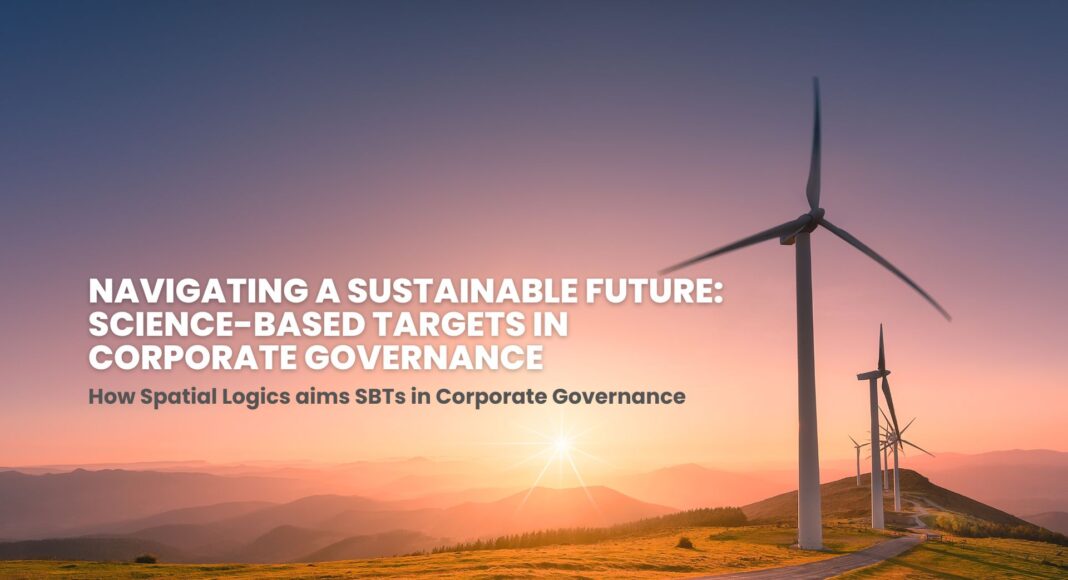In response to mounting climate concerns, the global shift toward a low-carbon economy is unmistakable. Science-Based Targets (SBTs) have emerged as a linchpin in this transformation, representing a strategic approach to mitigating Greenhouse Gas (GHG) emissions. Far from being mere aspirations, SBTs are precise strategies grounded in climate science, designed to cap global temperature increases at 1.5 to 2ºC above pre-industrial levels.
Unveiling the Significance of SBTs
At its essence, SBTs align with the urgency outlined by climate science, serving as navigational markers for industries. They ensure that GHG reduction efforts transcend symbolism, firmly grounded in scientific consensus. No longer a distant goal, setting SBTs has become a standard business practice, signifying a commitment to sustainable corporate governance and environmental stewardship.
The Crucial Role of SBTs
Meaningful Impact:
SBTs transcend superficial targets, demanding meaningful reductions in alignment with climate science. This ensures commendable and impactful reductions.
Global Standardization:
Universally applicable, SBTs transcend sectors and markets, fostering a standardized approach globally. This collective impact propels strides toward global decarbonization.
Supplier Engagement:
Acknowledging the interconnectedness of supply chains, the Science-Based Targets initiative introduces supplier engagement targets. These compel companies to influence suppliers, creating a cascading effect throughout the value chain.
Corporate Governance and SBTs
Integrating SBTs into corporate governance is not merely an environmental response; it’s a strategic imperative for forward-thinking organizations. Adopting SBTs reflects a commitment to long-term sustainability, resilience, and ethical business practices. As investors increasingly scrutinize companies based on environmental impact, SBT integration becomes fundamental in robust corporate governance frameworks.
Impact on Developing Countries
While SBT discourse often centers on global corporations, their impact on developing nations is profound. Multinational companies, through supplier engagement targets, inadvertently foster sustainable practices in regions vital to their operations. This not only aids environmental conservation but also stimulates economic growth, laying the groundwork for sustainable development.
Navigating Tomorrow’s Corporate Landscape with Spatial Logics and SBTs
In the era of climate consciousness, the trajectory toward a sustainable future is defined by the adoption of Science-Based Targets (SBTs). These targets, rooted in climate science, guide organizations in curbing GHG emissions and transitioning to a low-carbon economy. Amid this paradigm shift, companies like Spatial Logics play a pivotal role in translating SBTs into impactful results.
Unveiling Spatial Logics’ Approach
Spatial Logics, with its vision of Empowering Sustainable Urban Futures, integrates SBTs into its suite of services. Recognizing the transformative journey toward sustainability demands actionable strategies, the company embeds environmental stewardship, social responsibility, and robust governance into its projects.
Spatial Logics’ Role in SBTs
Holistic Sustainability Solutions:
Leveraging geospatial technologies and data sciences, Spatial Logics offers comprehensive sustainability solutions, aligning urban planning and infrastructure development with SBTs.
Tailored Urban Design:
Specializing in urban design that harmonizes with the environment, Spatial Logics ensures projects align with SBTs, fostering innovation and enhancing the quality of urban life.
Smart Cities Integration:
Spatial Logics employs smart cities and information technology to drive sustainability, empowering clients to exceed SBTs and create technologically advanced urban landscapes.
Data-Driven Decision-Making:
Prioritizing data sciences and AI, Spatial Logics equips clients with tools for precise trend analysis, facilitating decisions rooted in data and climate science alignment.
Global Collaboration:
Actively engaging in global collaborations, Spatial Logics brings international best practices to local projects, ensuring clients are part of a broader, interconnected movement toward sustainable development.
Commitment to ESG and Vision
Spatial Logics’ commitment to Environmental, Social, and Governance (ESG) principles goes beyond industry standards. By aligning services with SBTs, the company showcases a dedication to meeting present needs while safeguarding the future.
In Conclusion:
The ascent of Science-Based Targets underscores the evolving narrative of corporate responsibility, ushering in a future where economic growth intertwines with environmental stewardship. Embracing SBTs signifies a commitment to addressing climate change and contributes to a global paradigm shift toward a sustainable and resilient future.
The integration of SBTs into Spatial Logics’ approach signifies a commitment to Empowering Sustainable Urban Futures. As organizations strive to meet and exceed SBTs, Spatial Logics emerges as a trusted partner, offering innovative solutions that pave the way for a sustainable, resilient, and vibrant tomorrow.

